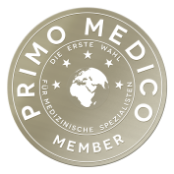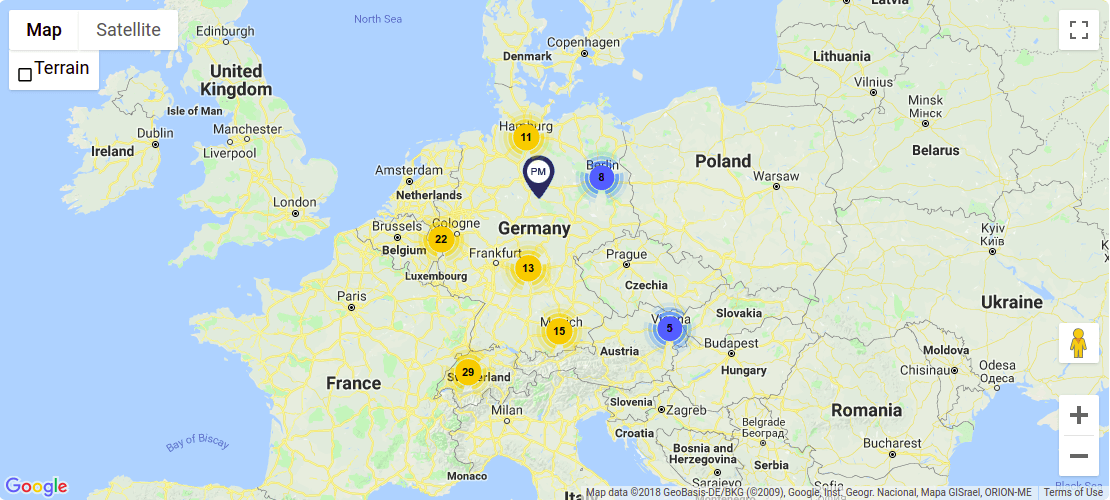Electrophysiology & Rhythmology Duisburg (NRW): Dr Ute Ruprecht
Medical Range
Range of Diagnostic Services
- Echocardiography
- CT
- Stress tests (ergometry, stress echocardiography, stress MRI)
- Transesophageal echocardiography
- Clarification of circulatory regulation disorders (Schellong test, carotid sinus test, 24h blood pressure profile)
- Long-term ECG
- Implantable event recorder
- Pacemaker and defibrillator outpatient clinic
Range of Therapeutic Services
- Catheter ablation of atrial fibrillation
- Ablation of ventricular tachycardias (VTs, endocardial and epicardial)
- Ablation of ventricular extrasystoles
- Cardioversion treatment
- Implantation of cardioverter defibrillators (ICD)
- Cardiac resynchronization therapy (CRT)
- Subcutaneous defibrillator system (S-ICD)
- Extraction of pacemaker or defibrillator probes
- Atrial appendage closure
More Information
Card
Dr Ute Ruprecht is a specialist in electrophysiology and head of the Section for Electrophysiology at the Duisburg Heart Center of the Evangelisches Klinikum Niederrhein.
Congenital and acquired cardiac arrhythmias are diagnosed by the Section for Electrophysiology specialized team at the Duisburg Heart Center under the direction of Dr Ruprecht and treated with state-of-the-art procedures. In addition to pharmacological measures, ablation procedures are used, particularly in rhythm therapy.
Heart Specialist with Many Years of Experience in Cardiological Electrophysiology
Finely tuned electronics determine the mechanical beat of the heart. A regular contraction of the heart muscle, which distributes the blood through the aorta in our body, only occurs through these electronic signals.
The conduction of excitation begins in the right atrium, in the sinus node, and makes its way through the atria into the ventricles. An electrical barrier between the atria and the ventricles ensures that the electrical stimulus can only be transmitted at one specific point, the AV node. If additional or misdirected electrical impulses excite the heart muscle, the complex interaction gets out of control, and cardiac arrhythmias result.
The Duisburg Heart Center has many years of experience in cardiological electrophysiology. The experts led by Dr Ute Ruprecht, M.D., diagnose and treat highly complex cardiac arrhythmias at the highest level of quality using the latest diagnostic methods.
The treatment is individually matched to the patient and can be carried out with medication and interventional methods. Antiarrhythmic drugs or ablation procedures are used therapeutically. Patients are informed in detail about all therapeutic options and are actively involved in decision-making.
Modern Cardiac Medicine: Pulmonary Vein Isolation for Atrial Fibrillation
Atrial fibrillation is a tachycardic arrhythmia characterized by accelerated and uncontrolled atrial excitation. A renewed impulse that occurs too quickly leads to a circular excitation and interrupts the finely tuned sequence of heart muscle contraction.
Due to the irregular contraction, the blood cannot be transported evenly, and there is an increased risk of forming a blood clot. In the worst case, this thrombus can reach the brain and trigger a stroke.
In many cases, arrhythmia is triggered by electrical signals emanating from the pulmonary veins. Because of this, electrophysiology specialists in Duisburg use a modern procedure to treat atrial fibrillation. The physicians create a non-conductive barrier of scar tissue around the veins, separating the electrical connection in this way.
A narrow line of muscle cells at the edge of the pulmonary veins can be selectively heated using a catheter advanced to the heart via the inguinal veins. This targeted heating with a high-frequency current to approximately 60° Celsius causes isolation of the pulmonary veins from the left atrium.
The procedure is carried out under sedation and usually takes about two hours. Subsequently, the patient remains in the hospital for one night, continuously monitoring vital signs after the procedure until the following day.
Sometimes, it may be necessary to take rhythm medication in the early phase after ablation to stabilize the heart rhythm. Taking an anticoagulant for two months after ablation is required to prevent thrombi. Depending on the individual risk, this therapy must be continued in some patients.
An ECG sensor can indicate any rhythm interruptions or disturbances for self-monitoring of the heart rhythm at home. If rhythm disturbances or other symptoms occur at home, patients should contact the rhythmology department immediately, where specialists can provide advice and assistance.
Therapy of Cardiac Arrhythmias Using Catheter Ablation
The catheter ablation treats interfering foci of excitation in the heart, interrupting signal transmission. The targeted "scarring" of the tissue responsible for the incorrect impulses is achieved using a high-frequency current, which generates heat in the tissue at specific points.
The catheter ablation procedure has proven to be one of the most reliable treatment methods for permanently stabilizing the heart rhythm. The short procedure is carried out in the cardiac catheterization laboratory, and patients are put into a short sedative sleep for the procedure.
Irregular Heartbeat: Implantation of Pacemakers
A heart rate that is too slow can be restored to normal by implanting a pacemaker. Implantation of the pacemaker is carried out in a short procedure and usually has few complications. Open-heart surgery is not necessary for this treatment.
The pacemaker is implanted through a small skin incision and connected to the heart. The physicians advance the necessary electrodes through a vein to the heart and connect them to the pacemaker. The pacemaker is then placed under the skin.
Patients can usually be discharged from the hospital after a very short time. They receive a pacemaker ID that can be presented before essential treatments and examinations in the hospital.
Implantation of Defibrillators: Greatest Expertise in the Treatment of Ventricular Fibrillation and Arrhythmias
Treatment with a defibrillator is an option for dangerous arrhythmias that often lead quickly to fainting or circulatory failure in the patient. The implant can intervene, for example, in life-threatening ventricular fibrillation and prevent sudden cardiac death by delivering an electric shock.
As with a pacemaker, the device is implanted via electrodes advanced to the heart and then connected to the device. The defibrillator is placed under the skin, and the incision is sutured. The implantation of pacemakers and defibrillators is a routine procedure carried out with the most extraordinary expertise by the specialists in electrophysiology at the Duisburg Heart Center.
Please, visit the website of the Electrophysiology Section for further information.
Curriculum Vitae
| Since October 2020 | Senior Physician in Charge / Electrophysiology at Duisburg Heart Center |
| October 2013 | Representative Head Physician, Alfried Krupp Krankenhaus Essen |
| February 2010 | Senior Physician Electrophysiology, Klinikum Dortmund |
| May 2009 | Focus Electrophysiology |
| December 2008 | Focus Cardiology / Klinikum Dortmund |
| November 2006 | Specialist in Internal Medicine / Klinikum Dortmund |
| November 2002 | Doctoral thesis: "The Gastrocolic Reflex and Other Reflexes" in Patients with Complete Paraplegia," Grade: Very Good |
| 2001 - 2006 | Assistant Physician, Department of Cardiology at the Klinikum Dortmund |
| 1999 - 2001 | Physician in Internship at St. Elisabeth Haus in Bochum / Internal Department |
| 1993 - 1999 | Study of Human Medicine at the Ruhr University Bochum |
Additional Qualifications
- Special Rhythmology / Invasive Electrophysiology
- since December 2020 Heart Failure (DGK Certifications)
- since April 2020 Special Rhythmology / Active Cardiac Rhythm Implants (DGK Certifications)
Team
- PhD Wim Aanhaanen
Representative Senior Physician
EHRA Examination in Rhythmology and Additional Qualification Special Rhythmology / Invasive Electrophysiology
DGK Certifications Additional Qualification Special Rhythmology Active Cardiac Rhythm Implants (since April 2020) - Amr Yousef
Acting Senior Physician
EHRA Examination in Rhythmology and Additional Qualification Special Rhythmology / Invasive Electrophysiology - Ahmed Ramadan
Cardiology Specialist - Ahmed Msheik
Fellow Electrophysiology
Transport Connections
| Duisburg Main Station | 6.6 km |
| Essen/Mühlheim Airport | 21 km |
| Düsseldorf Airport | 28 km |
| Köln/Bonn Airport | 75 km |
Information about Duisburg
Duisburg is the hinge into three regions: the idyllic Lower Rhine, the bubbling Ruhr area, and the legendary Rhine rail.
Duisburg, the inland port city on the Rhine and Ruhr, stretches from the western edge of the Ruhr metropolis to the Lower Rhine and merges with the Rhine rail to the south. The city sees itself as a hub of tourist and logistical routes and assumes an interesting hinge function within the varied regions.





